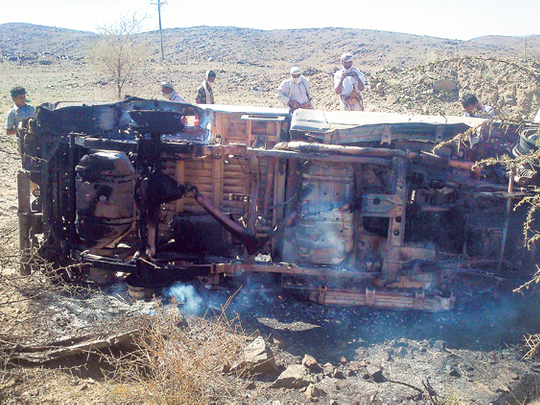
Washington: The Yemeni government paid the families of those killed or injured in a US drone strike last year more than $1 million (Dh3.67 million), according to documents that provide new details on secret condolence payments seen as evidence that civilians with no ties to Al Qaida were among the casualties.
The documents, which are signed by Yemeni court officials and victims’ relatives, record payouts designed to quell anger over a US strike that hit vehicles in a wedding party and prompted a suspension of the US military’s authority to carry out drone attacks on a dangerous Al Qaida affiliate.
The records reveal payments that are many times larger than Yemeni officials acknowledged after the strike. The $1 million-plus figure also exceeds the total amount distributed by the US military for errant strikes in Afghanistan over an entire year.
The documents also contain other details, including the identities of those killed or wounded in the December 12 operation by the US military’s Joint Special Operations Command (JSOC). Among them were a father and son with identification cards listing them as associates of a Yemeni organisation working to curb Islamist militancy. The father survived the strike but his 29-year-old son was killed.
The records were provided to The Washington Post by Reprieve, a London-based human rights organisation that has worked in Yemen to document civilian casualties of the US drone campaign.
Kat Craig, a legal director for the group, said the records undermine US claims “that the victims of this drone attack were anything other than civilians” and said the size of the payouts suggest that the Yemeni government — among the poorest in the Middle East — is being reimbursed by the United States.
The records indicate that families of those killed were each given Yemeni currency worth approximately $60,000, with smaller amounts paid to those who sustained injuries or whose vehicles were damaged or destroyed. “In Yemen, that is a life-changing amount of money,” Craig said. “I can’t believe those types of figures would be initiated by the Yemeni government.”
US officials declined to comment on the December 12 strike or any US role in the payments but acknowledged offering money to victims and their families when civilians are injured or killed.
“Although we will not comment on specific cases, were non-combatants killed or injured in a US strike, condolence or other ex gratia payments, such as solatia, may be available,” said Caitlin Hayden, spokesperson for the National Security Council at the White House, said in an e-mailed statement. She also said the US government “takes seriously all credible reports of non-combatant deaths and injuries” and seeks “to ensure that we are taking the most effective steps to minimise such risk to non-combatants.”
Other US officials who spoke on the condition of anonymity denied any US involvement in the payments.
Yemeni officials also declined to discuss the December 12 strike or the payments, but a Yemeni government official who viewed the Reprieve documents said they appeared to be authentic.
The records make no mention of the United States or its use of armed drones to carry out strikes against Al Qaida in the Arabian Peninsula (Aqap), as the group’s Yemen-based affiliate is known.
Nevertheless, the documents serve as the only fragments of a public record associated with the highly classified US drone campaign in Yemen and offer new details of a strike that remains the focus of debate within the United States.
US military officials have defended the attack and indicated that a subsequent investigation determined that Al Qaida-linked operatives — and no civilians — were killed.
But others in the Obama administration hold different views of the attack, which contributed to concerns among senior lawmakers that the US military is not ready to assume exclusive control of the drone campaign.
US officials have said that both the CIA and the National Counterterrorism Centre, which was directed by the White House to review the operation, concluded that civilians were probably injured or killed.
The US military has since abided by a Yemen-imposed suspension of JSOC’s authority to conduct strikes in the country. US officials indicated that the restriction is being reconsidered, but for now only the CIA has authority to launch lethal strikes in Yemen.
Airstrikes on Saturday that reportedly killed five militants in Yemen’s Shabwa province were widely described as US drone strikes in media accounts but were carried out by Yemeni aircraft, officials said.
— Washington Post












